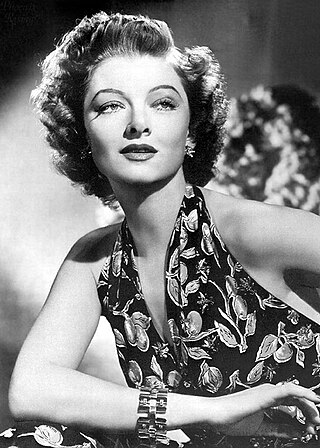
Myrna Loy was an American film, television and stage actress. As a performer, she was known for her ability to adapt to her screen partner's acting style.

Burton Leon Reynolds Jr. was an American actor and considered a sex symbol and icon of 1970s American popular culture. Reynolds first rose to prominence when he starred in television series such as Gunsmoke (1962–1965), Hawk (1966), and Dan August (1970–1971). He had leading roles in films such as Navajo Joe (1966) and 100 Rifles (1969), and his breakthrough role was as Lewis Medlock in Deliverance (1972).
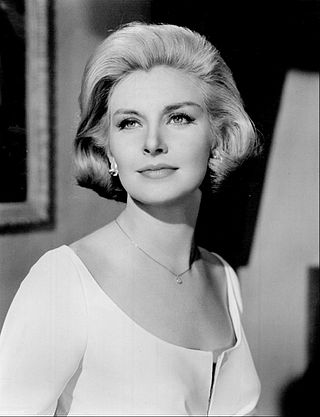
Joanne Gignilliat Trimmier Woodward is an American retired actress. She made her career breakthrough in the 1950s and earned esteem and respect playing complex women with a characteristic nuance and depth of character. Her accolades include an Academy Award, three Primetime Emmy Awards, a British Academy Film Award, three Golden Globe Awards, and a Screen Actors Guild Award. She is the oldest living Best Actress Oscar-winner.
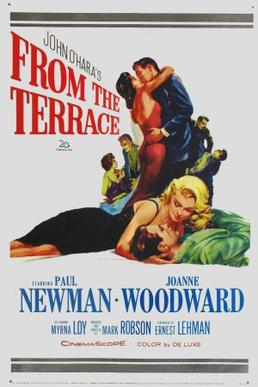
From the Terrace is a 1960 American DeLuxe Color romantic drama film in CinemaScope directed by Mark Robson from a screenplay by Ernest Lehman, based on the 1958 novel of the same name by John O'Hara. The film stars Paul Newman, Joanne Woodward, Myrna Loy, Ina Balin, George Grizzard, and Leon Ames, with a young Barbara Eden appearing in one scene. The plot tells the story of the estranged son of a Pennsylvania factory owner who marries into a prestigious family and moves to New York to seek his fortune.

Silent Movie is a 1976 American satirical silent comedy film co-written, directed by and starring Mel Brooks, released by 20th Century Fox in summer 1976. The ensemble cast includes Dom DeLuise, Marty Feldman, Bernadette Peters and Sid Caesar, with cameos by Anne Bancroft, Liza Minnelli, Burt Reynolds, James Caan, Marcel Marceau and Paul Newman as themselves. The film was produced in the manner of a 20th-century silent film, with intertitles instead of spoken dialogue; the soundtrack consists almost entirely of accompanying music and sound effects. It is an affectionate parody of slapstick comedies, including those of Charlie Chaplin, Mack Sennett and Buster Keaton. The film satirizes the film industry, presenting the story of a film producer trying to obtain studio support to make a silent film in the 1970s.

Dominick DeLuise was an American actor, comedian and author. Known primarily for comedy roles, he rose to fame in the 1970s as a frequent guest on television variety shows. He is widely recognized for his performances in the films of Mel Brooks and Gene Wilder, as well as a series of collaborations and a double act with Burt Reynolds. Beginning in the 1980s, his popularity expanded to younger audiences from voicing characters in several major animated productions, particularly those of Don Bluth.
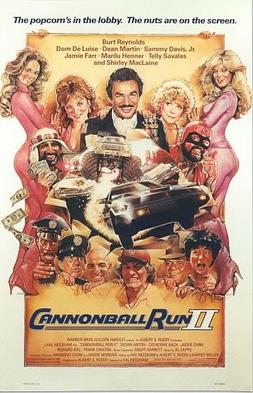
Cannonball Run II is a 1984 American action comedy film starring Burt Reynolds and an all-star cast, released by Warner Bros. and Golden Harvest. Like the original Cannonball Run, it is set around an illegal cross-country race.
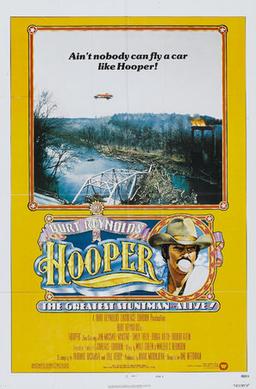
Hooper is a 1978 American action comedy film directed by Hal Needham and starring Burt Reynolds, Sally Field, Jan-Michael Vincent, Brian Keith, Robert Klein, James Best and Adam West. The film serves as a tribute to stuntmen and stuntwomen in what was at one time an underrecognized profession. At the time of filming, Field and Reynolds were in a relationship, having met on the set of Smokey and the Bandit the previous year.
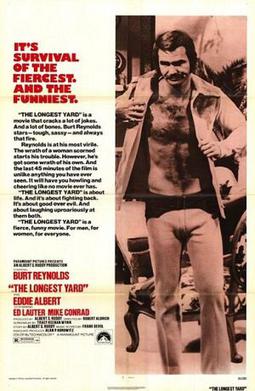
The Longest Yard is a 1974 American prison sports comedy-drama film directed by Robert Aldrich, written by Tracy Keenan Wynn, based on a story by producer Albert S. Ruddy, and starring Burt Reynolds, Eddie Albert, Ed Lauter, Mike Conrad and James Hampton. The film was released as The Mean Machine in the United Kingdom and South Africa. The film follows a former NFL player recruiting a group of prisoners and playing football against their guards. It features many real-life football players, including Green Bay Packers legend Ray Nitschke.

Smokey and the Bandit II is a 1980 American action comedy film directed by Hal Needham, and starring Burt Reynolds, Jackie Gleason, Jerry Reed, Dom DeLuise, Sally Field, Mike Henry, Paul Williams and Pat McCormick. The film is the second installment of the Smokey and the Bandit trilogy in the Smokey and the Bandit franchise and a sequel to Smokey and the Bandit (1977).
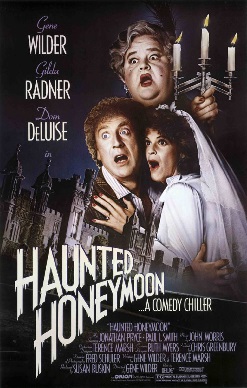
Haunted Honeymoon is a 1986 American comedy horror film starring Gene Wilder, Gilda Radner, Dom DeLuise and Jonathan Pryce. Wilder also served as writer and director. The title Haunted Honeymoon was previously used for the 1940 U.S. release of Busman's Honeymoon based on the stage play by Dorothy L. Sayers.

The Adventure of Sherlock Holmes' Smarter Brother is a 1975 American musical comedy film with Gene Wilder, Marty Feldman, Madeline Kahn, Dom DeLuise, Roy Kinnear, and Leo McKern. The film was Wilder's directorial debut, from his own original script.

Fatso is a 1980 American comedy-drama film written and directed by Anne Bancroft, her only such credit, and starring Dom DeLuise, Ron Carey and Candice Azzara. It was the first film produced by Mel Brooks's Brooksfilms company. The film examines the subject matter of obesity, addiction, family, self-acceptance and singlehood.

Double Wedding is a 1937 American screwball romantic comedy film starring William Powell and Myrna Loy, and featuring Florence Rice, John Beal, Jessie Ralph, and Edgar Kennedy. This was the seventh pairing of Powell and Loy, with another seven to go. It was directed by Richard Thorpe from a screenplay by Jo Swerling based on the unpublished play Nagy szerelem by Ferenc Molnár.

White Lightning is a 1973 American action film directed by Joseph Sargent, written by William W. Norton, and starring Burt Reynolds, Jennifer Billingsley, Ned Beatty, Bo Hopkins, R. G. Armstrong and Diane Ladd. It marked Laura Dern's film debut.

I Love You Again is an MGM comedy released in 1940. It was directed by W.S. Van Dyke and starred William Powell and Myrna Loy, all three of whom were prominently involved in the Thin Man film series.
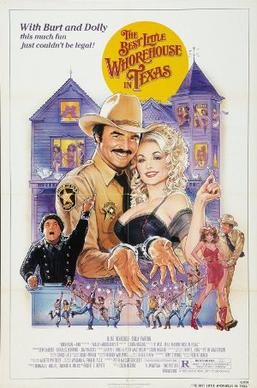
The Best Little Whorehouse in Texas is a 1982 American musical comedy film co-written, produced and directed by Colin Higgins. An adaptation of the 1978 Broadway musical of the same name, the film stars Burt Reynolds, Dolly Parton, Jim Nabors, Charles Durning and Dom DeLuise.

Parnell is a 1937 American biographical film produced by Metro-Goldwyn-Mayer, starring Clark Gable as Charles Stewart Parnell, the famous Irish politician. It was Gable's least successful film and is generally considered his worst, and it is listed in The Fifty Worst Films of All Time. The movie addresses the sex scandal that destroyed Parnell's political career, but its treatment of the subject is highly sanitized in keeping with Hollywood content restrictions at the time.
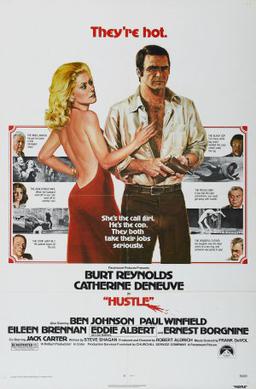
Hustle is a 1975 American neo-noir crime thriller film directed by Robert Aldrich, and starring Burt Reynolds and Catherine Deneuve.

Whipsaw is a 1935 American crime drama film directed by Sam Wood and starring Myrna Loy and Spencer Tracy. Written by Howard Emmett Rogers, based on a story by James Edward Grant, the film is about a government agent working undercover traveling across the country with an unsuspecting woman, hoping she will lead him to her gang of jewel thieves. The film was produced by Harry Rapf for Metro-Goldwyn-Mayer, and was released on December 18, 1935, in the United States.




















